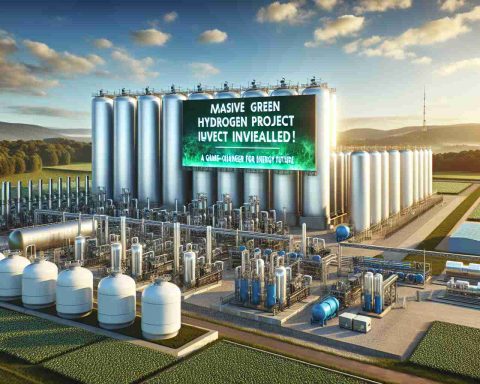Concerns are mounting over Thyssenkrupp Steel Europe’s (TKSE) approach to reducing carbon emissions, potentially disrupting Germany’s hydrogen network development, according to Open Grid Europe (OGE). OGE, a prominent gas grid operator, highlighted the potential challenges to the hydrogen network if TKSE, anticipated as a major hydrogen consumer, withdraws its demand. This would significantly impact the proposed hydrogen infrastructure.
Earlier this month, TKSE announced a review of its decarbonisation strategy. Industry reports suggest that the company is contemplating pausing its pivotal 3 billion euro project focused on hydrogen-based steel production. This project is central to TKSE’s strategy for reducing carbon emissions.
The head of OGE, Thomas Hüwener, expressed concern about the current status of the hydrogen economy, noting the slow progress and recent setbacks, including the cancellation of Norwegian low-carbon hydrogen projects. He metaphorically described the situation as being overshadowed by “dark clouds.”
The ambitious hydrogen grid in Germany is designed to interconnect key areas of hydrogen production, usage, and storage. The plan is to complete a network of 9,666 kilometers by 2032, with 60 percent of these lines repurposed from existing gas transport infrastructure. The Federal Network Agency (BNetzA) received a proposal for this network in July, submitted by Germany’s gas transmission operators.
Germany envisages steel producers as crucial players in its hydrogen economy. The government has committed 7 billion euros to support TKSE and other steel companies in transitioning to hydrogen-based production methods, facilitating the sector’s shift toward sustainable practices.
The Future of Hydrogen and Its Impact on Global Communities
Hydrogen is increasingly being recognized as a pivotal element in the transition towards cleaner energy systems worldwide. Its potential to significantly reduce carbon emissions is attracting attention from governments, industries, and environmental groups. However, as nations embark on this hydrogen journey, there are various implications for individuals, communities, and entire countries. This article delves into how the adoption of hydrogen technology affects daily lives, societal structures, and global politics, highlighting fascinating facts and ongoing controversies.
Hydrogen as a Clean Energy Source
Hydrogen’s appeal lies in its zero-emission output when used in fuel cells, emitting only water vapor and heat. This positions it as an ideal alternative to fossil fuels, especially in sectors like transportation and heavy industry, which are traditionally challenging to decarbonize. According to the International Energy Agency, hydrogen could potentially account for 10% of total energy use by 2050, dramatically reducing global carbon footprints.
Impact on Daily Life
For many individuals, the transition to a hydrogen economy might seem imperceptible at first. Yet, the ripple effects could be profound. As hydrogen-powered vehicles and public transport become more common, people will experience cleaner air and reduced noise pollution. Furthermore, as hydrogen fuel becomes more prevalent, energy costs could stabilize or even decrease, benefiting household finances.
In areas with high hydrogen production potential, new industries and job opportunities will likely emerge. This could incentivize skill development and training in communities, encouraging economic growth and reducing unemployment.
Community and National Implications
On a community level, regions that invest in hydrogen infrastructure early can establish themselves as clean energy hubs, attracting investment and innovation. This could lead to regional disparities, with some areas flourishing while others lag behind. Policymakers will need to consider equitable distribution of hydrogen infrastructure to ensure balanced development.
For countries heavily reliant on fossil fuels, the shift to hydrogen represents both a challenge and an opportunity. They must navigate the complexities of transitioning existing industries while seizing the chance to be leaders in new energy technologies. Nations like Japan and South Korea have already made significant investments, positioning themselves as pioneers in hydrogen technology.
Controversies and Challenges
Despite its potential, the hydrogen sector faces several controversies. One major debate centers around the source of hydrogen production. Green hydrogen, produced using renewable energy, is ideal but currently more expensive compared to blue or grey hydrogen, which is derived from natural gas and includes carbon emissions. Balancing economic feasibility with environmental responsibility remains a challenge.
Moreover, critics argue about the feasibility of large-scale hydrogen infrastructure. While projects such as Germany’s ambitious hydrogen grid plan to repurpose existing infrastructure, the financial and logistical obstacles remain significant. In countries with less developed energy infrastructures, creating a hydrogen economy from scratch might present insurmountable challenges.
The Global Political Landscape
Hydrogen’s rise also has geopolitical ramifications. Energy dependence is a significant factor in international relations, and as countries shift from oil and gas to hydrogen, power dynamics are likely to change. Nations rich in renewable resources could become new energy powerhouses, altering the current political landscape.
In conclusion, while hydrogen presents an exciting opportunity for cleaner, more sustainable energy, its adoption will have widespread implications. As communities and countries navigate this transition, there will be opportunities for economic growth and environmental benefits, but also challenges and controversies that require careful management.
For more information on the potential and challenges of hydrogen, visit the International Energy Agency at IEA.















